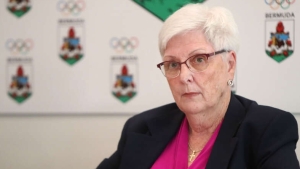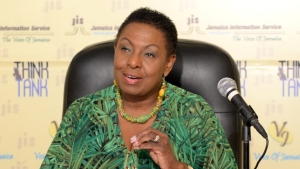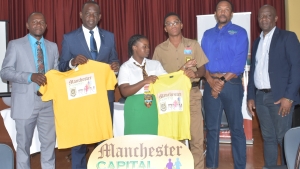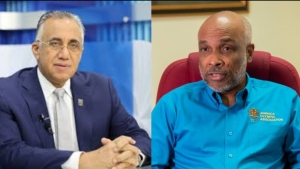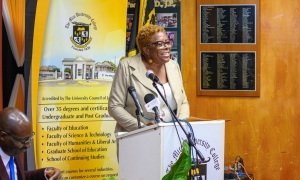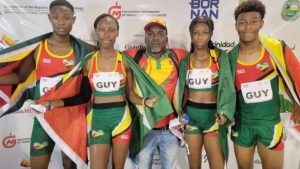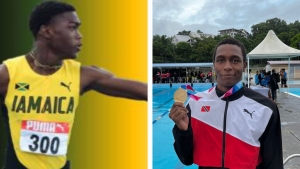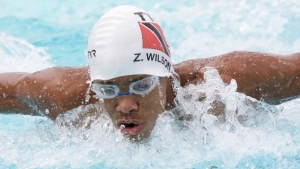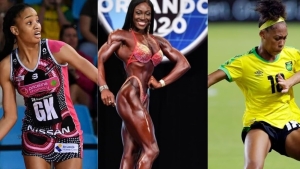It was a day of mixed fortunes for Caribbean nations on day four of the Commonwealth Youth Games, with most of their medal successes coming in the swimming pool at the National Aquatic Centre and on the track in Trinidad and Tobago, on Tuesday.
Trinidad and Tobago’s Zarek Wilson, was the highlight of the top performers from the region, as he added the men’s 100m butterfly gold to his 50m backstroke bronze. when he topped a quality field to win in a Junior Games Record of 53.70s. He bettered England’s Nick Finch (53.95s) and South Africa’s Dylan Eaton (54.41s).
Australia’s Mikayla Bird led an Oceanic sweep of the women’s 100m butterfly, as she won in 1:00.15, ahead of compatriot Lillie McPherson (1:00.80) and Amelia Bray (1:01.32) of New Zealand.
Heidi Stoute of Barbados won bronze in the women’s 400m freestyle after she stopped the clock in 4:25.61, behind the Australian pair of Inez Miller (4:14.97) and Erin Allen (4:18.72).
Tyler Melbourne-Smith of Wales proved too good for rivals in the men’s 400m freestyle, as he stopped the clock in 3:54.19, just staving off the challenge of England’s Reece Grady (3:54.74), with another Englishman Harry Wynne-Jones (3:56.29), taking third.
In athletics at Hasley Crawford Stadium, Tianna Springer (53.55s) and Narissa McPherson (54.82s) secured two medals for Guyana when they finished first and third in the women’s 400m final, separated by England’s Charlotte Henrich (53.65s).
Another Guyanese, Malachi Austin, placed second in the men’s 400m in 47.97s, behind Nigeria’s Samuel Ogazi (46.99s), while Alexander Beck (48.20s) of England, won bronze.
Dominica’s Godisha Joseph, placed seventh in the women’s discus throw final with a mark of 32.22 metres, while Trinidad and Tobago’s Ruth Irvine finished down the pack after failing to register a mark.
The event was won by South Africa’s Eli Khunou, who launched the instrument to 49.53m, ahead of Chelsy Wayne (49.39m) of Australia and Cyprus’s Rafaella Aristotelous (42.74m).
Andrew Stone of Cayman Islands topped the men’s long jump, after cutting that sand at 7.70m to win ahead of Temoso Masikane (7.51m) of South Africa.
Teon Haynes of Barbados (7.32m) took bronze, while the Trinidad and Tobago pair of Andrew Steele (7.16m) and Imanni Matthew (7.14m), were fourth and fifth respectively. Another Bajan, Aaron Massiah (6.63m) was 10th.
Guyana’s Attoya Harvey paced 11th in the women’s 1,500m final in 4:45.10, as the Kenyan pair of Nancy Cherop (4:12.28) and Janet Chepkemoi (4:14.24) secured a one-two finish, with England’s Lyla Belshaw (4:16.37), in third.
There was also a Kenya quinella in the men’s 1,500m event courtesy of Jospat Sang Kipkirui (3:37.66) and Andrew Kiptoo Alamisi (3:38.12), as Uganda’s Jacob Sande (3:39.69) took bronze.
Kipkirui’s time was also a new Commonwealth Youth Games record, as it was below the 3:39.80 set by another Kenyan Kumari Taki set in 2015.
South Africa’s Johann Lamberts finished tops in the men’s shot put when he achieved a new Commonwealth Youth Games record of 20.17m, erasing Jamaica’s Kevin Nedrick’s old mark of 20.12m. Robert Deal III (15.99m) of Bahamas and St Lucia’s Denzel Phillips (15.75m), were second and third respectively.
The Para men’s discus F42-44/F61-64 final, was won by South Africa’s Daniel Molobela, who achieved a mark of 26.34m, ahead of Kenya’s Titus Mwonga (20.00m), with Grenada’s Tyler Smith (18.85m) in third.
After earlier going down 22-14 to Trinidad and Tobago in the group stages of the men’s Rugby sevens tournament, Jamaica turned the tables on their Caribbean neighbours with a 12-5 win in the fifth-place playoff.
Scotland topped the men’s competition with a narrow 25-20 win over Fiji, while South Africa claimed bronze with a comprehensive 52-0 beating of Canada.
Meanwhile, Trinidad and Tobago’s women also played sixth after losing their fifth-place contest to Wales, who were dominant in a 50-0 victory.
Australia topped the podium after hammering Canada 50-0 in the gold medal game, with Fiji outlasting Kenya 22-10 in the bronze medal contest.
Earlier in triathlon at the Buccoo Beach Facility, Barbados placed fifth in the mixed team super sprint distance. They stopped the clock in 43 minutes and 24 seconds, over two minutes slower than winner Australia, who completed the event in 40 minutes and 58 seconds.
Scotland, who clocked 41 minutes and 23 seconds took silver ahead of Jersey (41 minutes and 37 seconds), a British Crown Dependency situated near the coast of North-West France.
With their accomplishments, the twin-island republic is the highest ranked Caribbean Island on the medal table, as they sit fourth with three gold and one silver. England heads the standing with 19 medals, followed by Scotland with nine, based on quality, while Australia with 15, sits third.
Cayman Islands, the next best Caribbean nation, occupies joint seventh with South Africa on five medals apiece.






















